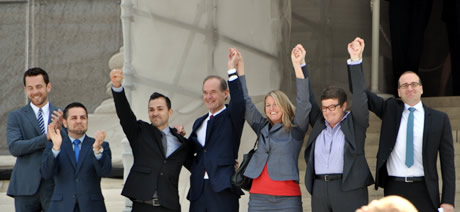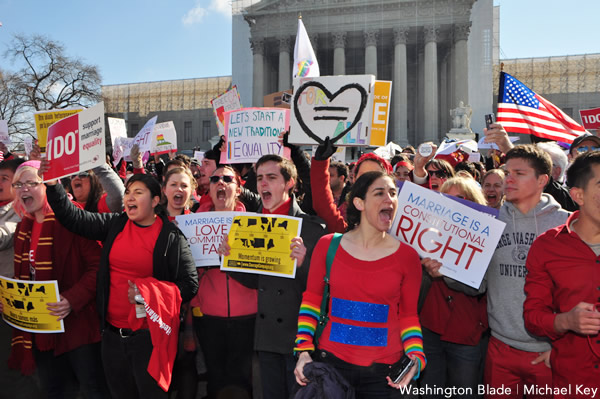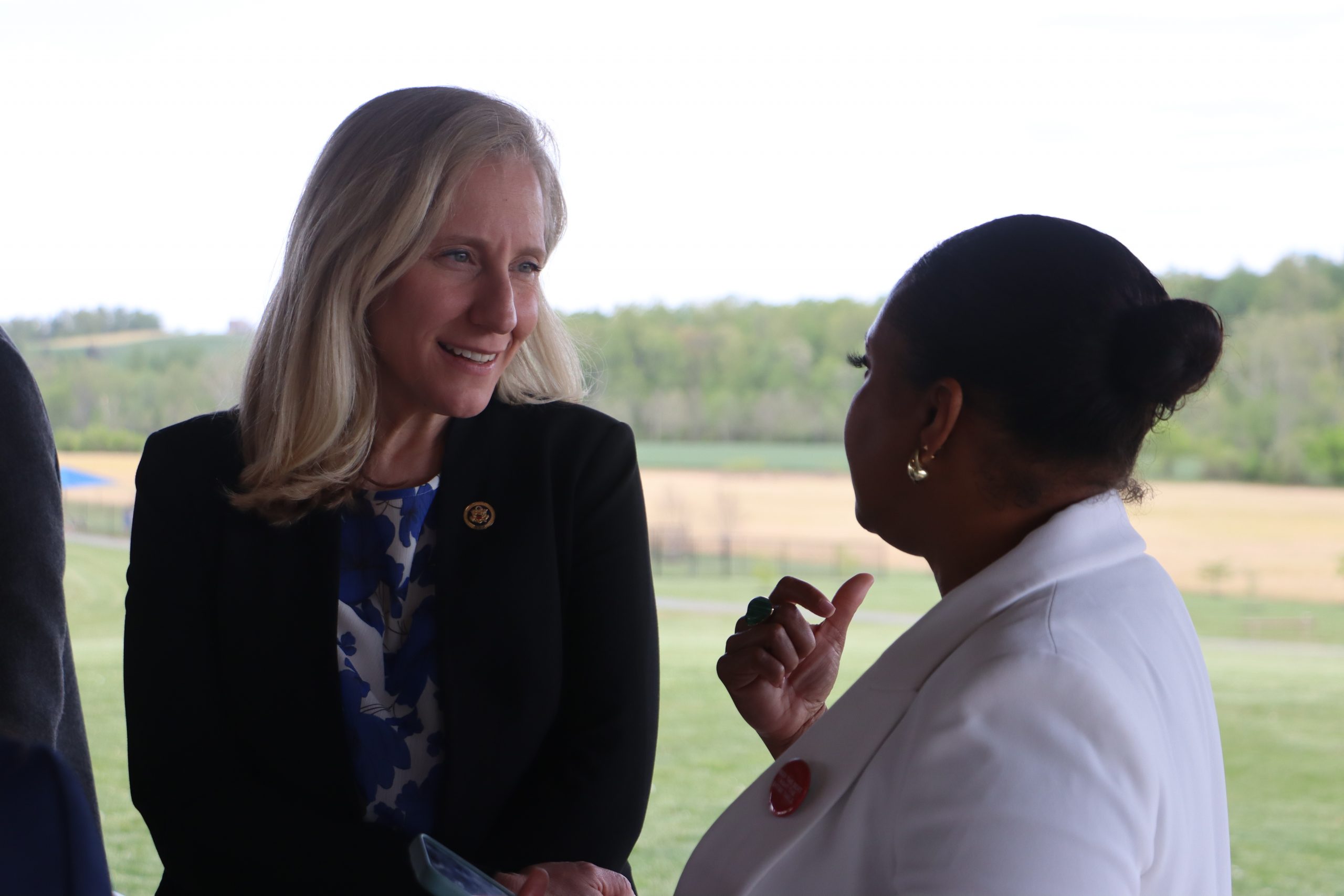News
HISTORIC: Supreme Court strikes down DOMA, Prop 8
DOMA violates equal protection; Prop 8 supporters lack standing


Gay marriage advocates rallying at the Supreme Court earlier this year during oral arguments for two major cases. The court struck down two anti-gay laws today, opening the door for expanded rights for same-sex couples in many jurisdictions. (Washington Blade photo by Michael Key)
In a historic development, the U.S. Supreme Court handed down two decisions on Wednesday that advanced marriage rights for gay couples and will almost certainly reshape the national debate on the issue.
In one 5-4 ruling, the court determined that the 1996 Defense of Marriage Act is unconstitutional because it violates due process and equal protection for same-sex couples under the Fifth Amendment to the U.S. Constitution. That decision means the U.S. government must begin recognizing same-sex marriages for a broad range of benefits, including those related to federal taxes and immigration law.
Associate Justice Anthony Kennedy wrote the opinion and was joined by Associate Justices Ruth Bader Ginsburg, Stephen Breyer, Sonia Sotomayor and Elena Kagan.
“The federal statute is invalid, for no legitimate purpose overcomes the purpose and effect to disparage and to injure those whom the State, by its marriage laws, sought to protect in personhood and dignity,” Kennedy said. “By seeking to displace this protection and treating those persons as living in marriages less respected than others, the federal statute is in violation of the Fifth Amendment.”
The dissenting justices were Chief Justice John Roberts and Associate Justices Antonin Scalia, Clarence Thomas and Samuel Alito. In his opinion, Roberts says Congress acted constitutionally in passing DOMA and took issue with the authority the court granted itself in overturning the anti-gay statute.
Writing his dissent, Scalia said the decision of the court robs the American public of its ability to decide the issue of same-sex marriage through the democratic process.
“Some will rejoice in today’s decision, and some will despair at it; that is the nature of a controversy that matters so much to so many,” Scalia writes. “But the Court has cheated both sides, robbing the winners of an honest victory, and the losers of the peace that comes from a fair defeat. We owed both of them better.”
In another 5-4 decision, the court determined anti-gay forces don’t have standing to defend California’s Proposition 8. That decision leaves in place a district court injunction that prohibits the state of California from enforcing its ban on same-sex marriage. Gay couples will be able to marry in the state once the U.S. Ninth Circuit Court of Appeals lift its stay.
Roberts wrote the majority opinion for the court and was joined by Scalia, Ginsburg, Breyer and Kagan. Kennedy wrote the dissenting opinion and was joined by Thomas, Alito and Sotomayor.
“The Article III requirement that a party invoking the jurisdiction of a federal court seek relief for a personal, particularized injury serves vital interests going to the role of the Judiciary in our system of separated powers,” Roberts writes. “States cannot alter that role simply by issuing to private parties who otherwise lack standing a ticket to the federal courthouse.”
The court’s ruling in the case against Prop 8, known as Hollingsworth v. Perry, is specific only to California — meaning the justices didn’t grant the expansive ruling that supporters of marriage equality had sought to bring marriage equality to all 50 states.
Shortly after HRC President Chad Griffin walked out of the court with plaintiffs in the marriage cases, he received a call from President Obama who was aboard Air Force One. Obama congratulated Griffin for the victories as reporters and onlookers watched.
The decisions were handed down 10 years to the day that the Supreme Court announced its landmark decision in the 2003 case of Lawrence v. Texas, which struck down state sodomy laws throughout the country.
The challenge to DOMA, known as United States v. Windsor, was filed by the American Civil Liberties Union and others in 2011 on behalf of lesbian New York widow Edith Windsor. Upon the death of her spouse Thea Spyer in 2009, Windsor had to pay the U.S. government $363,000 in estate taxes because of DOMA — a penalty that she wouldn’t have faced if she were married to a man.
The decision striking down DOMA affirms the initial rulings against the federal anti-gay law last year by U.S. District Judge Barbara Jones and the U.S. Second Circuit Court of Appeals.
The Obama administration helped in securing the ruling against DOMA. After it stopped defending DOMA in 2011, the U.S. Justice Department began filing briefs against the law and sent attorneys to litigate against it during oral arguments. U.S. Solicitor General Donald Verrilli argued against DOMA before the Supreme Court, saying the law doesn’t hold up under the standard heightened scrutiny, or a greater assumption it’s unconstitutional.
But the Supreme Court didn’t get to the issue of heightened scrutiny in the DOMA case because it found the law was unconstitutional under the less stringent standard of rational basis review.
The case against Prop 8 was filed by the California-based American Foundation for Equal Rights in 2009 on behalf of two plaintiff couples — a lesbian couple, Kristin Perry and Sandra Stier, and a gay male couple, Paul Katami and Jeffrey Zarrillo — who were unable to marry because of the state’s constitutional ban on same-sex marriage.
The attorneys representing them were Theodore Olson, a former U.S. solicitor general during the Bush administration, and David Boies, a so-called “dream team” of attorneys who represented opposite sides in the 2000 case Bush v. Gore.
Because the state officials — California Gov. Jerry Brown and Attorney General Kamala Harris — refused to defend Prop 8 in court, anti-gay groups that put Prop 8 on the ballot in 2008 such as ProtectMarriage.com took up the responsibility of defending the measure. The California Supreme Court certified the groups had standing under state law and the U.S. Ninth Circuit Court of Appeals affirmed they had standing.
But the high court determined that these groups — even though attorney Charles Cooper spoke on behalf on them in oral arguments — don’t have standing because they lack any legal injury in the wake of the lower court’s determination that Prop 8 is unconstitutional.
The Obama administration had also assisted in efforts to secure a ruling against California’s Proposition 8. The Justice Department filed a friend-of-the-court brief in February saying the ban was unconstitutional and Verrilli argued in court against Prop 8, suggesting all eight states with domestic partnerships should be required to grant marriage rights to gay couples.
The issue of standing also came up in the DOMA case for two reasons. One, the court had questioned whether the U.S. Justice Department could have appealed the district court ruling to the Second Circuit because the initial ruling against DOMA was what the Obama administration wanted. Two, the court questioned whether the Bipartisan Legal Advisory Group, a five-member Republican-majority panel within the U.S. House, had standing to take up defense of DOMA in the administration’s stead.
But the court determined an active controversy remains in the case because the U.S. government still hasn’t refunded Windsor the $363,000 she paid in estate taxes. Once the court determined it has jurisdiction based on the Obama administration’s appeal of the lawsuit, it didn’t get to the issue of whether BLAG has standing.
In his ruling, Kennedy writes the continuation of litigation in the absence of a federal ruling on DOMA would cause uncertainty.
“[T]he costs, uncertainties, and alleged harm and injuries likely would continue for a time measured in years before the issue is resolved,” Kennedy writes in the ruling. “In these unusual and urgent circumstances, the very term ‘prudential’ counsels that it is a proper exercise of the Court’s responsibility to take jurisdiction.”
U.S. Supreme Court
Supreme Court hears oral arguments in LGBTQ education case
Mahmoud v. Taylor plaintiffs argue for right to opt-out of LGBTQ inclusive lessons

The U.S. Supreme Court on Tuesday heard oral arguments in Mahmoud v. Taylor, a case about whether Montgomery County, Md., public schools violated the First Amendment rights of parents by not providing them an opportunity to opt their children out of reading storybooks that were part of an LGBTQ-inclusive literacy curriculum.
The school district voted in early 2022 to allow books featuring LGBTQ characters in elementary school language arts classes. When the county announced that parents would not be able to excuse their kids from these lessons, they sued on the grounds that their freedom to exercise the teachings of their Muslim, Jewish, and Christian faiths had been infringed.
The lower federal courts declined to compel the district to temporarily provide advance notice and an opportunity to opt-out of the LGBTQ inclusive curricula, and the 4th U.S. Circuit Court of Appeals determined that the parents had not shown that exposure to the storybooks compelled them to violate their religion.
“LGBTQ+ stories matter,” Human Rights Campaign President Kelley Robinson said in a statement Tuesday. “They matter so students can see themselves and their families in the books they read — so they can know they’re not alone. And they matter for all students who need to learn about the world around them and understand that while we may all be different, we all deserve to be valued and loved.”
She added, “All students lose when we limit what they can learn, what they can read, and what their teachers can say. The Supreme Court should reject this attempt to silence our educators and ban our stories.”
GLAD Law, NCLR, Family Equality, and COLAGE submitted a 40-page amicus brief on April 9, which argued the storybooks “fit squarely” within the district’s language arts curriculum, the petitioners challenging the materials incorrectly characterized them as “specialized curriculum,” and that their request for a “mandated notice-and-opt-out requirement” threatens “to sweep far more broadly.”
Lambda Legal, the Leadership Conference on Civil and Human Rights, PFLAG, and the National Women’s Law Center announced their submission of a 31-page amicus brief in a press release on April 11.
“All students benefit from a school climate that promotes acceptance and respect,” said Karen Loewy, senior counsel and director of constitutional law practice at Lambda Legal. “Ensuring that students can see themselves in the curriculum and learn about students who are different is critical for creating a positive school environment. This is particularly crucial for LGBTQ+ students and students with LGBTQ+ family members who already face unique challenges.”
The organizations’ brief cited extensive social science research pointing to the benefits of LGBTQ-inclusive instruction like “age-appropriate storybooks featuring diverse families and identities” benefits all students regardless of their identities.
Also weighing in with amici briefs on behalf of Montgomery County Public Schools were the National Education Association, the ACLU, and the American Psychological Association.
Those writing in support of the parents challenging the district’s policy included the Center for American Liberty, the Manhattan Institute, Parents Defending Education, the Alliance Defending Freedom, the Trump-Vance administration’s U.S. Department of Justice, and a coalition of Republican members of Congress.
U.S. Supreme Court
LGBTQ groups: SCOTUS case threatens coverage of preventative services beyond PrEP
Kennedy v. Braidwood oral arguments heard Monday

Following Monday’s oral arguments before the U.S. Supreme Court in Kennedy v. Braidwood Management, Inc., LGBTQ groups issued statements warning the case could imperil coverage for a broad swath of preventative services and medications beyond PrEP, which is used to reduce the risk of transmitting HIV through sex.
Plaintiffs brought the case to challenge a requirement that insurers and group health plans cover the drug regimen, arguing that the mandate “encourage[s] homosexual behavior, intravenous drug use, and sexual activity outside of marriage between one man and one woman.”
The case has been broadened, however, such that cancer screenings, heart disease medications, medications for infants, and several other preventive care services are in jeopardy, according to a press release that GLAAD, Lambda Legal, PrEP4All, Harvard Law’s Center for Health Law and Policy Innovation (CHLPI), and the Center for HIV Law and Policy (CHLP) released on Monday.
The Trump-Vance administration has argued the independent task force responsible for recommending which preventative services must be covered with no cost-sharing for patients is constitutional because the secretary of the U.S. Department of Health and Human Services can exercise veto power and fire members of the volunteer panel of national experts in disease prevention and evidence-based medicine.
While HHS secretaries have not exercised these powers since the Affordable Care Act was passed in 2010, Braidwood could mean Trump’s health secretary, Robert F. Kennedy Jr., takes a leading role in determining which services are included in the coverage mandate.
Roll Call notes the Supreme Court case comes as the administration has suspended grants to organizations that provide care for and research HIV while the ongoing restructuring of HHS has raised questions about whether the “Ending the HIV Epidemic” begun under Trump’s first term will be continued.
“Today’s Supreme Court hearing in the Braidwood case is a pivotal moment for the health and rights of all Americans,” said GLAAD President Sarah Kate Ellis. “This case, rooted in discriminatory objections to medical necessities like PrEP, can undermine efforts to end the HIV epidemic and also jeopardize access to essential services like cancer screenings and heart disease medications, disproportionately affecting LGBTQ people and communities of color.”
She added, “Religious exemptions should not be weaponized to erode healthcare protections and restrict medically necessary, life-saving preventative healthcare for every American.”
Lambda Legal HIV Project Director Jose Abrigo said, “The Braidwood case is about whether science or politics will guide our nation’s public health policy. Allowing ideological or religious objections to override scientific consensus would set a dangerous precedent. Although this case began with an attack on PrEP coverage, a critical HIV prevention tool, it would be a serious mistake to think this only affects LGBTQ people.”
“The real target is one of the pillars of the Affordable Care Act: The preventive services protections,” Abrigo said. “That includes cancer screenings, heart disease prevention, diabetes testing, and more. If the plaintiffs succeed, the consequences will be felt across every community in this country, by anyone who relies on preventive care to stay healthy.”
He continued, “What’s at stake is whether we will uphold the promise of affordable and accessible health care for all or allow a small group of ideologues to dismantle it for everyone. We as a country are only as healthy as our neighbors and an attack on one group’s rights is an attack on all.”
PrEP4All Executive Director Jeremiah Johnson said, “We are hopeful that the justices will maintain ACA protections for PrEP and other preventive services, however, advocates are poised to fight for access no matter the outcome.”
He continued, “Implementing cost-sharing would have an enormous impact on all Americans, including LGBTQ+ individuals. Over 150 million people could suddenly find themselves having to dig deep into already strained household budgets to pay for care that they had previously received for free. Even small amounts of cost sharing lead to drops in access to preventive services.”
“For PrEP, just a $10 increase in the cost of medication doubled PrEP abandonment rates in a 2024 modeling study,” Johnson said. “Loss of PrEP access would be devastating with so much recent progress in reining in new HIV infections in the U.S. This would also be a particularly disappointing time to lose comprehensive coverage for PrEP with a once every six month injectable version set to be approved this summer.”
“Today’s oral arguments in the Braidwood case underscore what is at stake for the health and well-being of millions of Americans,” said CHLPI Clinical Fellow Anu Dairkee. “This case is not just about legal technicalities — it is about whether people across the country will continue to have access to the preventive health services they need, without cost sharing, regardless of who they are or where they come from.”
She continued, “Since the Affordable Care Act’s preventive services provision took effect in 2010, Americans have benefited from a dramatic increase in the use of services that detect disease early, promote healthy living, and reduce long-term health costs. These benefits are rooted in the work of leading scientists and public health experts, including the U.S. Preventive Services Task Force, whose recommendations are based on rigorous, peer-reviewed evidence.”
“Any shift away from cost-free access to preventive care could have wide-ranging implications, potentially limiting access for those who are already navigating economic hardship and health disparities,” Dairkee said. “If Braidwood prevails, the consequences will be felt nationwide. We risk losing access to lifesaving screenings and preventive treatments that have become standard care over the past decade.”
“This case should serve as a wake-up call: Science, not politics, must guide our health care system,” she said. “The health of our nation depends on it.”
“We are grateful for the Justices who steadfastly centered constitutionality and didn’t allow a deadly political agenda to deter them from their job at hand,” said CHLP Staff Attorney Kae Greenberg. “While we won’t know the final decision until June, what we do know now is not having access to a full range of preventative healthcare is deadly for all of us, especially those who live at the intersections of racial, gender and economic injustice.”
“We are crystal clear how the efforts to undermine the ACA, of which this is a very clear attempt, fit part and parcel into an overall agenda to rollback so much of the ways our communities access dignity and justice,” he said. “Although the plaintiffs’ arguments today were cloaked in esoteric legal language, at it’s heart, this case revolves around the Christian Right’s objection to ‘supporting’ those who they do not agree with, and is simply going to result in people dying who would otherwise have lived long lives.”
“This is why CHLP is invested and continues in advocacy with our partners, many of whom are included here,” Greenberg said.
Virginia
EXCLUSIVE: HRC PAC to endorse Spanberger for Va. governor
Former congresswoman to face off against state’s GOP lieutenant governor

The Human Rights Campaign PAC on Tuesday will endorse Democratic nominee Abigail Spanberger’s run for governor of Virginia, the organization told the Washington Blade.
The former CIA agent-turned-congresswoman, who represented her state’s 7th Congressional District from 2019 to 2025, will face off against Republican Lieutenant Gov. Winsome Earle-Sears in this year’s gubernatorial race.
A Roanoke College survey in February found Spanberger in the lead with a comfortable margin, 39-24, while a trio of polls in January found her ahead by one, five, and 10 percentage points.
Virginia’s incumbent Republican Gov. Glenn Youngkin, who is prohibited from seeking a second term under the state’s constitution, has consistently restricted LGBTQ rights and attacked the transgender community since taking office in 2022.
HRC said Spanberger’s candidacy “offers Virginians renewed hope for a future rooted in equality,” with the group’s president, Kelley Robinson, calling her “a champion for the LGBTQ community.”
Noting the former congresswoman’s co-sponsorship of the Equality Act, legislation that would expand federal anti-discrimination protections to include LGBTQ people, Robinson said Spanberger “understands that Virginia’s future success depends on the full inclusion and protection of all its people.”
HRC’s president added, “As governor, she will work tirelessly to build a Virginia where everyone — regardless of who they are or who they love — can live, work, and go to school with dignity, safety, and opportunity. We are thrilled to support her and mobilize pro-equality Virginians to make her the commonwealth’s next governor.”
Responding to news of the endorsement, Spanberger said “I’m honored to earn the endorsement of the Human Rights Campaign, and I’m ready to work together to build on the progress we’ve made to secure equal protections for all Virginians under the law.”
“Affirming that Virginia is a welcoming home for all families goes beyond protecting marriage equality — it means defending Virginians’ right to live without fear of discrimination or harm,” she said. “As governor, I will work to make sure that no Virginian is denied government services, loses a job, or faces any other form of discrimination because of who they love or who they are.”
HRC further noted that Spanberger fought to pass the Respect for Marriage Act, which was signed into law in 2022 and codified legal protections for married same-sex and interracial couples, as well as her promise to “defend marriage equality and work with the General Assembly to enshrine marriage equality in Virginia’s constitution.”
Spanberger has also committed to “signing legislation guaranteeing Virginians’ right to access contraception and birth control,” HRC wrote, “and protecting against attempts by extreme judges and politicians to roll back Virginians’ reproductive freedoms.”
By contrast, the organization criticized Sears’s LGBTQ rights record — noting that in 2004, she pledged to “emphatically support a constitutional amendment” banning same-sex marriage, in 2021, she campaigned with a gubernatorial candidate who said homosexuality was the “work of the devil,” and in 2022, she “dodged questions” about her position on marriage equality and “attempted to rewrite her hateful history.”
Since 1977, with only one exception, Virginia has elected governors who belong to the party that is out of power at the presidential level. The state’s upcoming off-year gubernatorial contest presents an opportunity for Democrats who are eager for a major electoral victory to channel momentum against President Donald Trump and Republican majorities in Congress.
-

 Obituary4 days ago
Obituary4 days agoLocal attorney, LGBTQ rights advocate Dale Sanders dies at 75
-

 U.S. Federal Courts3 days ago
U.S. Federal Courts3 days agoFederal judge blocks Trump passport executive order
-

 Mexico4 days ago
Mexico4 days agoGay couple claims Puerto Vallarta wedding venue discriminated against them
-

 Books3 days ago
Books3 days ago‘Pronoun Trouble’ reminds us that punctuation matters











